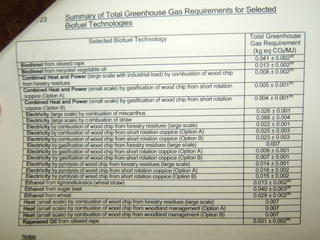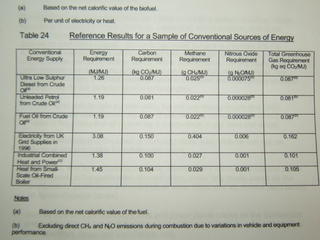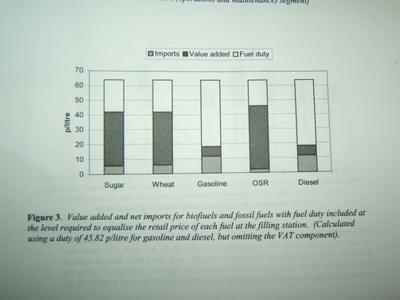Biofuels: An ecologically friendly form of energy?
The reason for me looking at biofuels is simple: it is a divisive issue, even amongst environmentalists. I don't like sitting on the fence, so it was time to get reading.
Biofuels are fuels which are produced from crops or waste biological materials such as cooking oil. The reason that governments are interested in biofuels is that they are fundamentally carbon neutral, although there are some important 'real world' complications. Biofuels are fundamentally carbon neutral because unlike fossil fuels, which release carbon dioxide from a carbon source which was previously looked away underground. Biofuels are made from plants which during there growth have taken carbon dioxide out of the atmosphere, so when this is then released during combustion the net effect is zero flux (movement) of carbon dioxide to or from the atmosphere.
If biofuels are carbon neutral then where is the debate, that is a huge climate mitigation result isn it? It turns out that the debate is justified for two reasons 1. To be ecologically friendly the impact of biomass must be looked at on both a local and a global scale i.e biodiversity and agricultural impact. 2. Fuel is needed to harvest the crop and to produce the fertilizer that it uses and to transport the fuel etc... The case for increasing the use of biofuels therefore relies on these two issues, along with one other, if it turns out the impact on ecology is limited and that there is some reduction in carbon dioxide emitted once the whole system is taken into account then is the biofuel industry self sustaining, and if not what the cost of the carbon reduction?
My first finding is that biofuels have the support of the EU, apparently as part of its climate change policy, this indicates that net emissions are seen in Europe as lower than from using fossil fuels directly in transport. This finding was latter supported in a report commissioned the UK department of the environment (DEFRA) which found that when looking at 18 different types of biofuel strategies that:
"all the biofuel technologies considered achieve, in varying degrees, positive energy and greenhouse gas benefits"
The Net energy ratio (NER) of biofuels is a way to represent the amount of carbon emissions they are responsible for, it relates energy content of fuel and energy required in all the processes required to deliver that fuel. Due to lack of studies the NER of biofuels isn't well established, however levels of around 1.5-2.0 are most prevalent in the current literature, this means you get 1.5 to 2.0 times the energy out of a biofuel compared to what it takes to grow, harvest and transport that fuel. When the carbon emissions are compared to those of fossil fuels it is found that there is greater differential in total carbon emissions than might be expected, this is because fossil fuels also require to be transported, often over vast distances and the carbon emissions in sum are far more than tailpipe emissions. Unleaded petrol emits around 0.081 kg CO2 per MJ energy used by the car, this compares poorly to 0.029Kg for wheat derived ethanol, or even biodesil from oilseed rape 0.041Kg.
More info in tables below. (Click for full image)


The negative environmental impacts of biofuels result from the potential decrease in set-aside, the increased use of fertilizers and pesticides on any land that is brought under cultivation when currently being used for grazing. The crops to be used for are varied, oil seed rape, wheat, sugar beat, miscanthus and willow short coppice rotation (SCR). There are also a number of waste products which could be used for bioethanol and bio-diesel, these are likely to be small in size but most positive in terms of overall energy yields and little negative environmental impact. Oil seed rape and wheat are likely to constitute a significant part of the UK biofuel crop requirements, there is likely to be little impact of swapping one of these for another cereal, or visa versa on UK land, both are already prominent crops and take up only one part of a typical crop rotation scheme. Miscanthus is not currently a UK crop but is a tall grass of high lignin content that, like other grasses has very little fertilizer requirement (therefore low energy input) and is being grown on a bulk scale for its composition, not its aesthetics or for a delicate fruit so pesticide use should also be relatively low. The main negative impact on the environment form biofuels is likely to occur when set-aside is replaced by oil seed rape, thus removing a significant amount of biodiversity and habitat from wildlife. It is also notable that displacing any crop with biofuels will force that crop overseas, unless set-aside is used, and this will lead to greater external transport costs than predicted.
My research has lead me to be a believer in biofuels generally but not an avid proponent. As the UK Environment Food and Rural Affairs committee point out:
'The use of biofuels to replace conventional fuels in transport can help reduce greenhouse gas emissions. Biofuels are the only source of renewable power currently suitable for road transport and as such have an important role in reducing the environmental impact of this sector'
The economics of biofuels have probably imporved significantly in the UK since the reports i am using where published, at that time, only two years ago, fuel prices where about 70p a litre in the UK, now they are approaching a pound a litre! So it seems biofuels may have a more independent and rapidly growing industry due to fuel security and the spectre of peak-oil. The table below shows a breakdown of the costs of biofuels, and the advantages to the uk, namely more jobs at home in farming and processing.

My belief is that biofuels do have great potential, particularly in tropical regions, and that a mix is the most sensible way to supply the fuel. The cost of carbon dioxide emissions reductions is, however rather high and the local environmental impact will probably be sizeable, particularly in the UK if set-aside becomes used for biofuel crops. Transport is the most difficult sector to address in terms of climate policy but equality suggests it should play its part, it is for this reason that I support biofuels but wait with anticipation for the hydrogen economy, which would integrate so well with the distributed energy systems discussed in an earlier essay, hydrogen being readily produced by flowing electricity through water.
The documents used in composing this article can be found here, and more generally, info on all climate change action articles can be found here.
[UPDATE: many people, myself included, where enthusiastic about biofuels. Recent developments dont support that enthusiasm.]

Home

 del.icio.us
del.icio.us

 Digg This!
Digg This!


Biofuels are fuels which are produced from crops or waste biological materials such as cooking oil. The reason that governments are interested in biofuels is that they are fundamentally carbon neutral, although there are some important 'real world' complications. Biofuels are fundamentally carbon neutral because unlike fossil fuels, which release carbon dioxide from a carbon source which was previously looked away underground. Biofuels are made from plants which during there growth have taken carbon dioxide out of the atmosphere, so when this is then released during combustion the net effect is zero flux (movement) of carbon dioxide to or from the atmosphere.
If biofuels are carbon neutral then where is the debate, that is a huge climate mitigation result isn it? It turns out that the debate is justified for two reasons 1. To be ecologically friendly the impact of biomass must be looked at on both a local and a global scale i.e biodiversity and agricultural impact. 2. Fuel is needed to harvest the crop and to produce the fertilizer that it uses and to transport the fuel etc... The case for increasing the use of biofuels therefore relies on these two issues, along with one other, if it turns out the impact on ecology is limited and that there is some reduction in carbon dioxide emitted once the whole system is taken into account then is the biofuel industry self sustaining, and if not what the cost of the carbon reduction?
My first finding is that biofuels have the support of the EU, apparently as part of its climate change policy, this indicates that net emissions are seen in Europe as lower than from using fossil fuels directly in transport. This finding was latter supported in a report commissioned the UK department of the environment (DEFRA) which found that when looking at 18 different types of biofuel strategies that:
"all the biofuel technologies considered achieve, in varying degrees, positive energy and greenhouse gas benefits"
The Net energy ratio (NER) of biofuels is a way to represent the amount of carbon emissions they are responsible for, it relates energy content of fuel and energy required in all the processes required to deliver that fuel. Due to lack of studies the NER of biofuels isn't well established, however levels of around 1.5-2.0 are most prevalent in the current literature, this means you get 1.5 to 2.0 times the energy out of a biofuel compared to what it takes to grow, harvest and transport that fuel. When the carbon emissions are compared to those of fossil fuels it is found that there is greater differential in total carbon emissions than might be expected, this is because fossil fuels also require to be transported, often over vast distances and the carbon emissions in sum are far more than tailpipe emissions. Unleaded petrol emits around 0.081 kg CO2 per MJ energy used by the car, this compares poorly to 0.029Kg for wheat derived ethanol, or even biodesil from oilseed rape 0.041Kg.
More info in tables below. (Click for full image)


The negative environmental impacts of biofuels result from the potential decrease in set-aside, the increased use of fertilizers and pesticides on any land that is brought under cultivation when currently being used for grazing. The crops to be used for are varied, oil seed rape, wheat, sugar beat, miscanthus and willow short coppice rotation (SCR). There are also a number of waste products which could be used for bioethanol and bio-diesel, these are likely to be small in size but most positive in terms of overall energy yields and little negative environmental impact. Oil seed rape and wheat are likely to constitute a significant part of the UK biofuel crop requirements, there is likely to be little impact of swapping one of these for another cereal, or visa versa on UK land, both are already prominent crops and take up only one part of a typical crop rotation scheme. Miscanthus is not currently a UK crop but is a tall grass of high lignin content that, like other grasses has very little fertilizer requirement (therefore low energy input) and is being grown on a bulk scale for its composition, not its aesthetics or for a delicate fruit so pesticide use should also be relatively low. The main negative impact on the environment form biofuels is likely to occur when set-aside is replaced by oil seed rape, thus removing a significant amount of biodiversity and habitat from wildlife. It is also notable that displacing any crop with biofuels will force that crop overseas, unless set-aside is used, and this will lead to greater external transport costs than predicted.
My research has lead me to be a believer in biofuels generally but not an avid proponent. As the UK Environment Food and Rural Affairs committee point out:
'The use of biofuels to replace conventional fuels in transport can help reduce greenhouse gas emissions. Biofuels are the only source of renewable power currently suitable for road transport and as such have an important role in reducing the environmental impact of this sector'
The economics of biofuels have probably imporved significantly in the UK since the reports i am using where published, at that time, only two years ago, fuel prices where about 70p a litre in the UK, now they are approaching a pound a litre! So it seems biofuels may have a more independent and rapidly growing industry due to fuel security and the spectre of peak-oil. The table below shows a breakdown of the costs of biofuels, and the advantages to the uk, namely more jobs at home in farming and processing.

My belief is that biofuels do have great potential, particularly in tropical regions, and that a mix is the most sensible way to supply the fuel. The cost of carbon dioxide emissions reductions is, however rather high and the local environmental impact will probably be sizeable, particularly in the UK if set-aside becomes used for biofuel crops. Transport is the most difficult sector to address in terms of climate policy but equality suggests it should play its part, it is for this reason that I support biofuels but wait with anticipation for the hydrogen economy, which would integrate so well with the distributed energy systems discussed in an earlier essay, hydrogen being readily produced by flowing electricity through water.
The documents used in composing this article can be found here, and more generally, info on all climate change action articles can be found here.
[UPDATE: many people, myself included, where enthusiastic about biofuels. Recent developments dont support that enthusiasm.]
Labels: biofuels

Home









0 Comments:
Post a Comment
<< Home